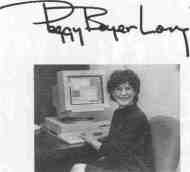 |
Home | Search | Browse | About IPO |
Staff |
Links |
EDITOR'S NOTEBOOK

by Peggy Boyer Long
Impediments to legislative reform today are centered not in public apathy or executive jealousy but in the attitudes within the legislative branch itself.
The late Illinois governor, Republican Richard Ogilvie, wrote those words for Strengthening the States:
Essays on Legislative Reform, edited in 1971 by Donald G. Herzberg and Alan Rosenthal. These days the book gathers dust. (The copy I found in the library hadn't been checked out in five years.) Indeed, many of the suggestions for improving state legislatures, offered by governors, lawmakers and scholars, are dated. Yet Ogilvie's words remain pertinent, as does his theme: legislative authority and responsibility.
One roadblock to a productive legislature, Ogilvie argued, is some lawmakers' views on prospective votes. "Do these [votes] constitute opportunities or burdens?" he asked. "Does [the lawmaker] approach a decision with the expectation of gaining public support or with the fear of voter reprisal?" He wasn't finished. "These negative legislators," he added, "believe that the best possible session is one in which there is no need to cast any votes."
Ogilvie came to mind as we put this issue together, and as 1 prepared to attend a conference in Sacramento on California's 30-year experiment with the "professional" legislature. Illinois Issues and representatives of public affairs publications in Massachusetts, North Carolina and Texas were invited to assess the legislative processes in our respective states.
The conclusion of many conference participants: Old problems may have been solved, but new ones appear on the horizon. First some history. Between the late '60s and the mid-'70s, politicians and scholars in a number of states were engaged in a debate about the quality of state legislatures. Commissions were created. Studies were issued. And the general assessment was that the legislatures were ineffectual. In their collection, Herzberg and Rosenthal wrote: "We believe that the well- being of the states and the health of the nation are inextricably linked. This volume ... is dedicated to the proposition that if state government is to be strengthened, state legislatures must be improved."
The Citizens Conference on State Legislatures went so far as to rank the 50 legislatures, using such criteria as independence and representativeness. The Sometime Governments, also published in 1971, included guidelines for improvement: full-time lawmakers who are adequately paid; legislative staff; an open and orderly process.
Illinois was ranked third overall in the quality of its legislature, behind California and New York. Our ranking was due in part to the 1970 state Constitution, which strengthened the independence of the legislature. And it was due to the members of the Commission on the Organization of the General Assembly, headed by former Democratic state Rep. Harold Katz, also a contributor to the Herzberg/Rosenthal book.
Still, California clearly set the pace. Jesse Unruh, former California Assembly speaker, was among the first pushing to professionalize legislatures. (He was also among the first to concentrate fund raising for targeted legislative races in the hands of the leadership.)
The debate some 30 years ago focused on ways to provide legislatures with adequate resources to do a good job: independence from the executive, time, office space, help with policy research, livable wages for lawmakers.
So how are legislatures faring? Many now have the physical and fiscal resources. And that's good news. Yet some participants at this fall's conference worried about the unintended consequences of the professional legislature. In place of citizen legislators, they see careerists concerned only with re-election. High stakes mean increasing partisanship; more expensive campaigns; a closer dance between politicians and interest groups; and a concentration of leadership power at the expense of member independence. Most alarming, some worry legislatures are losing hard-won autonomy to a public grown angry over gridlock.
If California is a trendsetter, there is reason to worry. Power to set public policy in that state has begun to shift to citizen (read special interest funded) initiatives, and away from term-limited lawmakers. So Ogilvie's words may carry a greater warning than he knew. If lawmakers don't take their responsibilities seriously, the legislatures may be in danger of losing their authority.
Illinois Issues November 1997 / 4